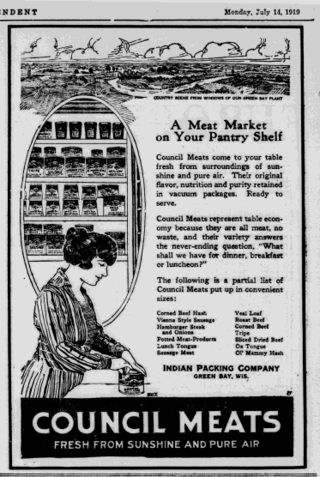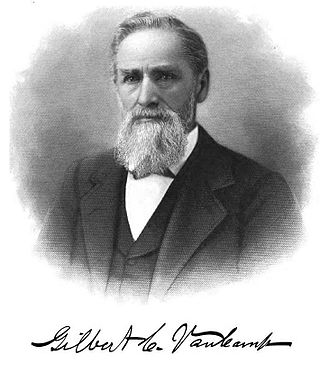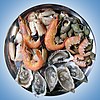Related Research Articles

The Federal Meat Inspection Act of 1906 (FMIA) is an American law that makes it illegal to adulterate or misbrand meat and meat products being sold as food, and ensures that meat and meat products are slaughtered and processed under strictly regulated sanitary conditions. These requirements also apply to imported meat products, which must be inspected under equivalent foreign standards. United States Department of Agriculture (USDA) inspection of poultry was added by the Poultry Products Inspection Act of 1957 (PPIA). The Food, Drug, and Cosmetic Act authorizes the Food and Drug Administration (FDA) to provide inspection services for all livestock and poultry species not listed in the FMIA or PPIA, including venison and buffalo. The Agricultural Marketing Act authorizes the USDA to offer voluntary, fee-for-service inspection services for these same species.
The United Food and Commercial Workers International Union (UFCW) is a labor union representing approximately 1.3 million workers in the United States and Canada in industries including retail; meatpacking, food processing and manufacturing; hospitality; agriculture; cannabis; chemical trades; security; textile, and health care. UFCW is affiliated with the Canadian Labour Congress (CLC) and the AFL–CIO; it disaffiliated from the AFL–CIO in 2005 but reaffiliated in 2013. UFCW is also affiliated to UNI Global Union and the IUF.

The meat-packing industry handles the slaughtering, processing, packaging, and distribution of meat from animals such as cattle, pigs, sheep and other livestock. Poultry is generally not included. This greater part of the entire meat industry is primarily focused on producing meat for human consumption, but it also yields a variety of by-products including hides, dried blood, protein meals such as meat & bone meal, and, through the process of rendering, fats.
Arbogast & Bastian, also known as A&B Meats, was the name of a slaughterhouse and meat packing plant located in Allentown, Pennsylvania. Once a national leader in hog slaughtering, the company had the capacity to process most of the 850,000 hogs raised annually in Pennsylvania for slaughtering. In its heyday, Arbogast & Bastian slaughtered an average of 4,000 hogs daily.

The meat industry are the people and companies engaged in modern industrialized livestock agriculture for the production, packing, preservation and marketing of meat. In economics, the meat industry is a fusion of primary (agriculture) and secondary (industry) activity and hard to characterize strictly in terms of either one alone. The greater part of the meat industry is the meat packing industry – the segment that handles the slaughtering, processing, packaging, and distribution of animals such as poultry, cattle, pigs, sheep and other livestock.

The 66th United States Congress was a meeting of the legislative branch of the United States federal government, comprising the United States Senate and the United States House of Representatives. It met in Washington, D.C., from March 4, 1919, to March 4, 1921, during the last two years of Woodrow Wilson's presidency. The apportionment of seats in the House of Representatives was based on the 1910 United States census.

The 67th United States Congress was a meeting of the legislative branch of the United States federal government, consisting of the United States Senate and the United States House of Representatives. It met in Washington, D.C., from March 4, 1921, to March 4, 1923, during the first two years of Warren Harding's presidency. The apportionment of seats in the House of Representatives was based on the 1910 United States census.

The 75th United States Congress was a meeting of the legislative branch of the United States federal government, composed of the United States Senate and the United States House of Representatives. It met in Washington, D.C., from January 3, 1937, to January 3, 1939, during the fifth and sixth years of Franklin D. Roosevelt's presidency.
Packer or Packers may refer to:

The Packers and Stockyards Act of 1921 regulates meatpacking, livestock dealers, market agencies, live poultry dealers, and swine contractors to prohibit unfair or deceptive practices, giving undue preferences, apportioning supply, manipulating prices, or creating a monopoly. It was enacted following the release in 1919 of the Report of the Federal Trade Commission on the meatpacking industry.
The Canadian Meat Council is Canada's national trade association for the federally inspected meat packers and processors. It is an industry trade group associated with the meat packing industry. Federally inspected plants account for over 90% of all the meat processed in Canada.
The Select Committee on the Transportation and Sale of Meat Products, also known as the Vest Committee, after its first chairman Senator George G. Vest of Missouri, was a select committee of the United States Senate from 1887 – 1921. It was established to consider various aspects of the meat packing industry.

Jobbers Canyon Historic District was a large industrial and warehouse area comprising 24 buildings located in downtown Omaha, Nebraska, US. It was roughly bound by Farnam Street on the north, South Eighth Street on the east, Jackson Street on the south, and South Tenth Street on the west. In 1989, all 24 buildings in Jobbers Canyon were demolished, representing the largest National Register historic district loss to date.

The Indian Packing Company was a company that was involved in the canned meat industry and was incorporated in Delaware on July 22, 1919. Its canned meat sold as "Council Meats." When the company was absorbed by the Illinois-based Acme Packing Company in 1921, it had facilities in Green Bay, Wisconsin; Providence, Rhode Island; Greenwood, Indiana; and Dupont, Indiana. At the time of the sale it was controlled by New England Supply Company of Providence, Rhode Island, with F.P Comstock as its principal owner.
Swift & Co. v. United States, 196 U.S. 375 (1905), was a case in which the United States Supreme Court ruled that the Commerce Clause allowed the federal government to regulate monopolies if it has a direct effect on commerce. It marked the success of the Presidency of Theodore Roosevelt in destroying the "Beef Trust". This case established a "stream of commerce" argument that allows Congress to regulate things that fall into either category. In particular it allowed Congress to regulate the Chicago slaughterhouse industry. Even though the slaughterhouse supposedly dealt with only intrastate matters, the butchering of meat was merely a "station" along the way between cow and meat. Thus, as it was part of the greater meat industry that was between the several states, Congress can regulate it. The Court's decision halted price fixing by Swift & Company and its allies.
President Chester A. Arthur signed the Animal Industry Act on May 29, 1884 creating the Bureau of Animal Industry (BAI), an organization that was established under the United States Department of Agriculture. It replaced the Veterinary Division that had been created by the Commissioner of Agriculture in 1883, which had taken over for the Treasury Cattle Commission, Department of Treasury.

Gilbert C. Van Camp was an Indianapolis businessman who founded the Van Camp canning company.
Jobber, in merchandising, can be synonymous with "wholesaler", "distributor", or "intermediary". A business which buys goods and bulk products from importers, other wholesalers, or manufacturers, and then sells to retailers, was historically called a jobbing house. A jobber is a merchant—e.g., (i) a wholesaler or (ii) reseller or (iii) independent distributor operating on consignment—who takes goods in quantity from manufacturers or importers and sells or resells or distributes them to retail chains and syndicates, particularly supermarkets, department stores, drug chains, and the like. One objective is to distribute goods at lower costs through economies of scale, which, in sophisticated operations, typically uses complex transportation models. In competitive markets, the practice is an integral part of supply chain management—one that might incorporate, among other things, operations research in areas of logistics involving supply chain networking, and supply chain optimization. A jobber is very different from a broker. A broker transacts on behalf of a merchandiser while a jobber supplies inventory at a merchandiser's site for consumers to purchase.

John Plankinton was an American businessman. He is noted for expansive real estate developments in Milwaukee, including the luxurious Plankinton House Hotel designed as an upscale residence for the wealthy. He was involved with railroading and banking. The Plankinton Bank he developed became the leading bank of Milwaukee in his lifetime. He was involved in the development of the Milwaukee City Railroad Company, an electric railway.
A meat jobber, also known as a meat wholesaler or meat distributor is an entity that purchases meat products from producers, typically in large quantities, and sells them to retailers.
References
- ↑ Agriculture, United States Congress House Committee on (1920). Meat-packer Legislation: Hearings Before the Committee on Agriculture, House of Representatives, Sixty-sixth Congress, Second Session. U.S. Government Printing Office. pp. 2473–2474. Retrieved 2 May 2024.
 This article incorporates text from this source, which is in the public domain .
This article incorporates text from this source, which is in the public domain . - 1 2 Geisst, Charles R.; Geisst, Ambassador Charles a Gargano Professor of Finance Charles R. (14 May 2014). "Meat packing industry". Encyclopedia of American Business History. Infobase Publishing. pp. 266–268. ISBN 978-1-4381-0987-9.
- ↑ The Packing Industry: A Series of Lectures Given Under the Joint Auspices of the School of Commerce and Administration of the University of Chicago and the Institute of American Meat Packers. 1924. p. 150. Retrieved 2 May 2024.
- ↑ Schueren, Arnold C. (1927). Meat Retailing. Vaughan Company. p. 16.

